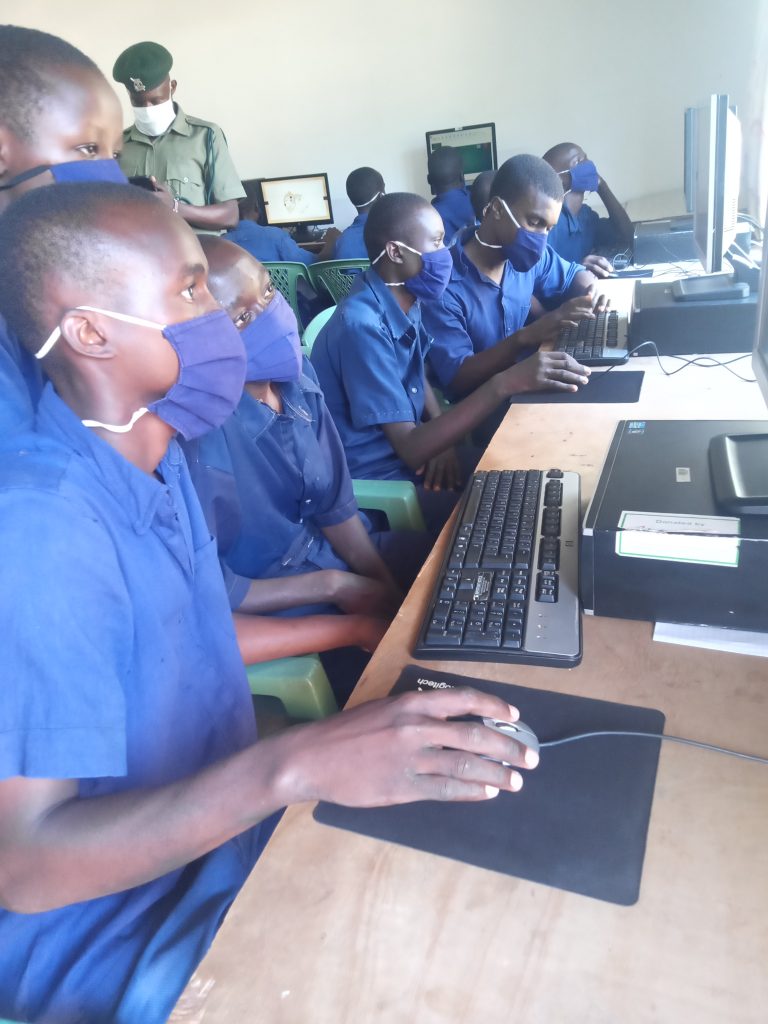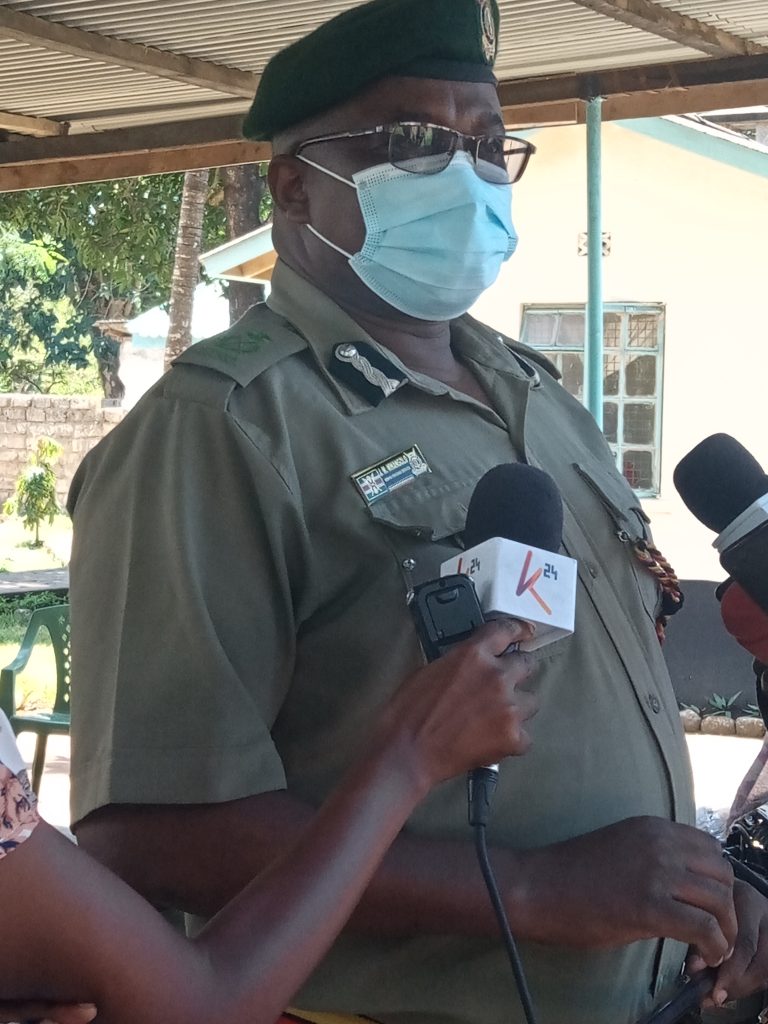Safaricom Foundation Injects One Million to Shimo-la-Tewa Borstal Institute

SSP Fairbain ombeva and Joseph Ogutu Foundation chair joined by one of the Youth unveil the Computer lab at Shimo La Tewa Borstal Institute. Image: MWAKWAYA RAYMOND
By MWAKWAYA RAYMOND
Email: thecoastnewspaper@gmail.com
Shimo la Tewa Borstal is one of the four institutions in Kenya whose mandate is to reform and re-integrate young offenders into society after empowering them with technical and vocational education training.
This was in mind when the Safaricom Foundation chairman Joseph Ogutu visited the institution on September 2, 2020 to support it with Sh1 million through its economic empowerment programme.
The institution which consists of 299 TVET students received farm implements, wiring tools, carpentry tools, tools for mechanical training and 8 computers.
“Our investment in economic empowerment aims to ensure full and productive employment and decent work for Kenyans. Supporting Shimo la Tewa for instance is not only a way of reforming the society but an effective way of engaging the youth and empowering them through skills training,” he said.
To unlock the potentials of the 47 counties, the foundation has partnered with different communities, organisations and institutions to improve and transform lives.
With a strong history dating back to 2003, Safaricom Foundation has worked with speed, simplicity and trust to implement over 1,000 community projects and impacting over three million people.
THEMATIC AREAS
Through its thematic areas of health, education, environmental conservation, economic empowerment, water, arts and culture, and disaster relief, the foundation intends to invest Sh2.2 million in eight projects across Coast region.
Apart from Shimo-la-Tewa Borstal, other projects that have benefitted include Taru physically challenged group in Kwale County, Wesa Pefa Children’s Home, Kilifi County and Lola Rako women group.

“To contribute towards Vision 2030 and the Sustainable Development Goals, we will leverage the power of innovation and technology to drive our projects forward; and will also offer a blend of grants, equity and ultra-low-cost loans to our partners,” says Mr Ogutu.
In his response, Coast deputy regional commander Jonathan Mwavita noted that the youth from correctional centres came out with life skills after undergoing various training programmes.
However, the commander is concerned by the perception of the public during the re-integration process of juvenile offenders to society.
‘I want to call upon the entire public to accept those who we release to the society because they are now reformed and changed people,” he pleaded.

On her part, the senior superintendent prison (SSP) Fairbain Ombeva disclosed that the institution was partnering with various organizations to realize their goals in correcting youth in the society.
According to her the institution released 100 youths to the public due to the outbreak of the Covid 19 pandemic.
‘Since the outbreak of the Covid 19 we have released 100 youth because the board sat only once this year,” she said adding that their external partnerships have equipped them and placed their charges when sourcing for opportunities in the society.
HISTORY OF BORSTAL
The idea of having a borstal institution was borrowed from a village called Borstal in England where young people who had broken the law were isolated and rehabilitated.
In Kenya, Shikusa Borstal was open to the first offender in 1963 and two years later, Shimo la Tewa Borstal was established.
Today, there are four borstal institutions in the country established by an Act of Parliament (Chapter 92) to rehabilitate children who have committed serious offenses but are too young (below 18years) to be placed with adults in regular prisons.
They are Shikusa (Kakamega), Shimo la Tewa (Shanzu, Mombasa), Kamiti Youth Corrective Training Centre and Kamae Girls Borstal (both are an annexure of Kamiti Maximum Prison, Kiambu).
The main purpose of a borstal institution is to deter youthful offenders from criminal behavior through vigorous training and counseling programs dabbed “short sharp shock” (SSS).
These involve taking young offenders through short but strenuous activities to make them refrain from criminal activities.
But for re-entering society successfully, finding work, living fulfilling lives and key to reducing reoffending is what bothers the correctional facilities.
The Shimo-la-Tewa Borstal receives youthful offenders from Coast, North Eastern, Eastern, Rift Valley and Central regions and is administered by the correctional services department. It holds boys from age 15 to 18 for a maximum of three years irrespective of the gravity of the offence.
In fact, informal education and vocational training are at the heart of the institutional system as the engine of social mobility and engine of offender’s rehabilitation.
COASTAL BENEFICIARIES
Beneficiaries of Safaricom Foundation are water pumps and fish coolers to Tsamvulani Mwache Fishermen and Traders Association, Kwale County (Sh125,000), baking machine and baking stands and baking tables and metallic trays to Uhenzani Self helf Goup, Kwale County (Sh200,000) and posho mill to Taru Physically Challenged Group, Kwale County (Sh100,000).
Others are workshop equipment to Shimo-la-Tewa Borstal Institution, Mombasa County (Sh1,000,000), solar pump system to Wesa Pefa Children’s Home, Kilifi County (Sh67,000), four sewing machines, one centre table and 1000 needles to Bahati Disabled Group, Kilifi (Sh100,000) and coconut grating machine, 10 buckets, one white cotton, five funnels, sauce pan and 10 plastic containers to Lola Rako Women, Kilifi County (Sh207,950).
With its personalised and hands-on approach towards partnerships, the foundation ensures project monitoring and provision of technical assistance, learning and capacity building.
Edited by Mwakera Mwajefa

